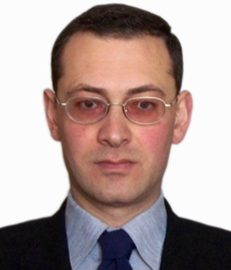Turkey-Armenia Relations after Turkey’s Elections[Over]  Armen Grigoryan, Armen Grigoryan,
EGF Guest Contributor
The outcome of Turkey’s recent parliamentary elections may partly reduce tensions in relations with Armenia, stopping the mounting hostile rhetoric of recent months. A normalization of bilateral relations should not be expected at this stage, but the trend of increasing cooperation in the humanitarian area, and in culture, tourism, and the media in recent years will likely continue. At the same time, some policies may need READ MORE
This article was first published by the "Central Asia-Caucasus Analyst, Central Asia-Caucasus Institute & Silk Road Studies Program Joint Center" which holds the copyright for it.
- Wednesday, 8 February 2017, 12:51
EGF convenes high level expert seminar on Nagorno-Karabakh conflict resolution in Tbilisi[Over]
On 22 July 2015, EGF convened a further dialogue event between Armenian and Azerbaijani experts in its ongoing sequence on "What the South Caucasus Region Could Be: Exploring the Role of Economic Initiatives as Peace Building Tools in the Nagorno-Karabakh Context" in Tbilisi (Georgia). Similar to previous events of this nature held in 2014, the Tbilisi meeting unfolded in a constructive atmosphere and aimed to assess the role of economic initiatives in building peace in the Nagorno-Karabakh context. READ MORE
Uzbekistan President Karimov’s long-term vision of a Central Asian Nuclear Weapons Free Zone is now much closer to realisation[Over] 
 Snapshot analysis by Ben McPherson, Principal Editor, European Geopolitical Forum
Snapshot analysis by Ben McPherson, Principal Editor, European Geopolitical Forum
In May 2014 an important initiative, the Central Asian Nuclear Weapon Free Zone, or CANWFZ, was enshrined by the actions of five nuclear states—the United States, the United Kingdom, France, China and Russia—as they signed a Protocol agreeing to respect the non-proliferation framework. The idea has been discussed since at least 1993, when the President of Uzbekistan, Islam Karimov, proposed it at the UN General Assembly. READ MORE
- Monday, 2 March 2015, 15:25
The South Caucasus between Russia and the European Union[Over]
 Elkhan Nuriyev, Elkhan Nuriyev,
EGF Affiliated Expert
The mounting tension over Ukraine has introduced numerous dangers to the security situation in the South Caucasus. These negative ramifications are further exacerbated by the fact that Russia holds the key to resolving conflicts in the post-Soviet realm, especially in the absence of greater Western assertiveness. But Moscow and Brussels are caught up in geopolitical competition over the region. READ MORE
Despite hopes, Substantial Obstacles Remain for Near-Term Iraqi Gas Exports[Over]  Ahmed Mousa Jiyad, Ahmed Mousa Jiyad,
EGF Affiliated Expert
Following closely after the ground-breaking Turkey-Russia gas export/pipeline MoU announced last week, another agreement was publicized between the Iraqi government and the KRG that could send additional KRG gas to Turkey. Some argue that, if the KRG ramps up and exports significant volumes, it could pose problems for Putin’s new plan. EGF Affiliated Expert Ahmed Mousa Jiyad explains why this is unlikely. READ MORE
- Wednesday, 10 December 2014, 10:54
Sailing the Unsettled South Caucasus through Troubled Waters towards Regional Integration[Over]  George Vlad Niculescu,
George Vlad Niculescu,
Head of Research, the European Geopolitical Forum
Just like other parts of Eurasia, the South Caucasus is facing the challenge of a renewed East-West geopolitical competition underpinned by three evolving challenges: 1) a growing ideological gap between Russia and the West; 2) the chronic persistence of protracted conflicts; 3) the dilemma of post-Soviet states: European vs. Eurasian integration. More specifically, the South Caucasus geopolitical landscape is shaped by: READ MORE
- Tuesday, 25 November 2014, 20:56
Stakeholder Consultation Round Two - Exploring the Role of Economic Initiatives as Peace Building Tools in the Nagorno-Karabakh Context [UPDATED][Over]
The second stakeholder consultation round in EGF's ongoing Nagorno-Karabakh research took place on 06-08 July 2014 in Berlin (Germany), including introduction of a post-conflict scenario building workshop. More than 30 experts from Armenia, Azerbaijan, and international partner NGOs and institutions attended this highly successful event, held in a constructive atmosphere of exchange. It has been the first step towards exploring the idea of a roadmap leading towards an economically integrated South Caucasus, and created a platform for exchange of information between Armenian and Azerbaijani experts. During the post-conflict scenario building workshop, regional participants simulated the negotiation of a roadmap for the implementation of economic components of a peace agreement built upon the Madrid principles, encompassing joint economic measures in areas such as energy, transport, trade, rehabilitation of the territories affected by the conflict, and the return of IDPs to their homeland.
Please click here for the summary of conclusions.
Please click here to see the agenda of the seminar, and participants’ biographies.
Please click here to see the EGF presentation on this research.
One man, one party hangs onto power in Montenegro[Over]  Vasilije Boskovic, Vasilije Boskovic,
EGF Guest Contributor
Montenegro is the only former Yugoslav republic where there was no change of government since 1989. The same political party, the Democratic Party of Socialists (DPS), has ruled for 25 years consecutively. The party is led by Prime Minister Milo Djukanovic, who was also president of the Republic of Montenegro from 1998 to 2002. What are the reasons the same political elite can hold onto power for more than two decades? READ MORE
Click here to read also "Protest virus appears contagious in Bosnia".
- Tuesday, 25 November 2014, 20:54
|
|
